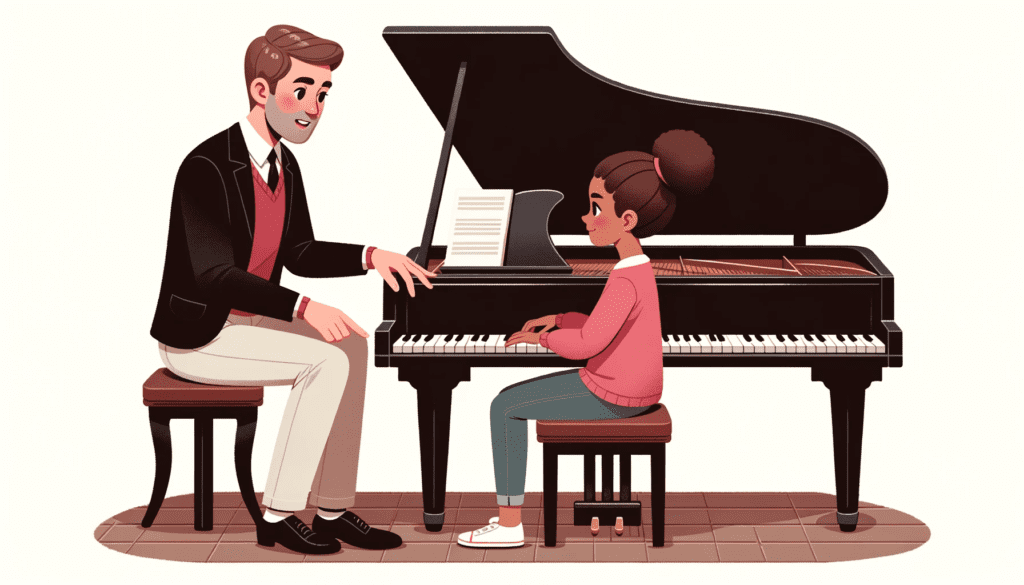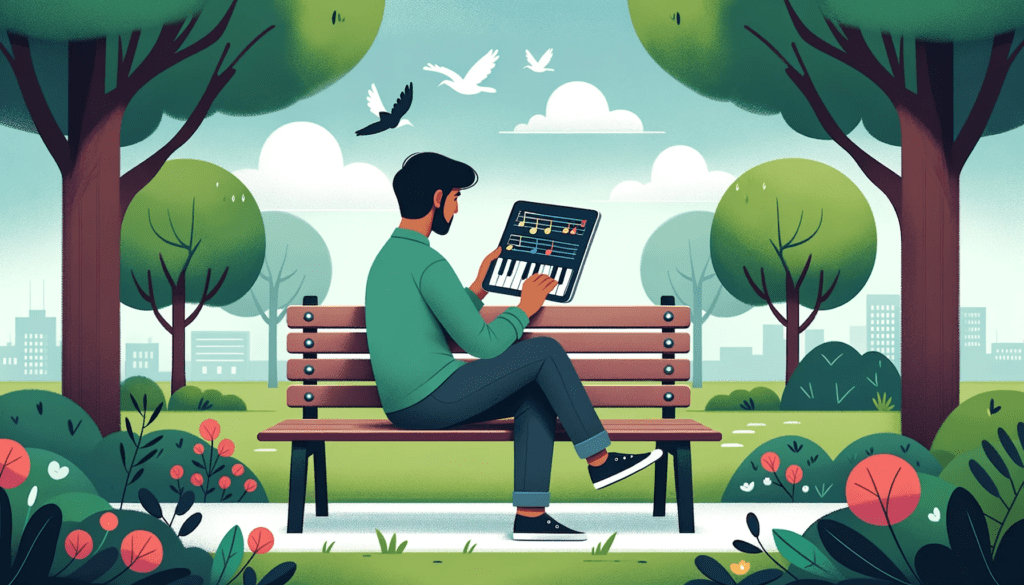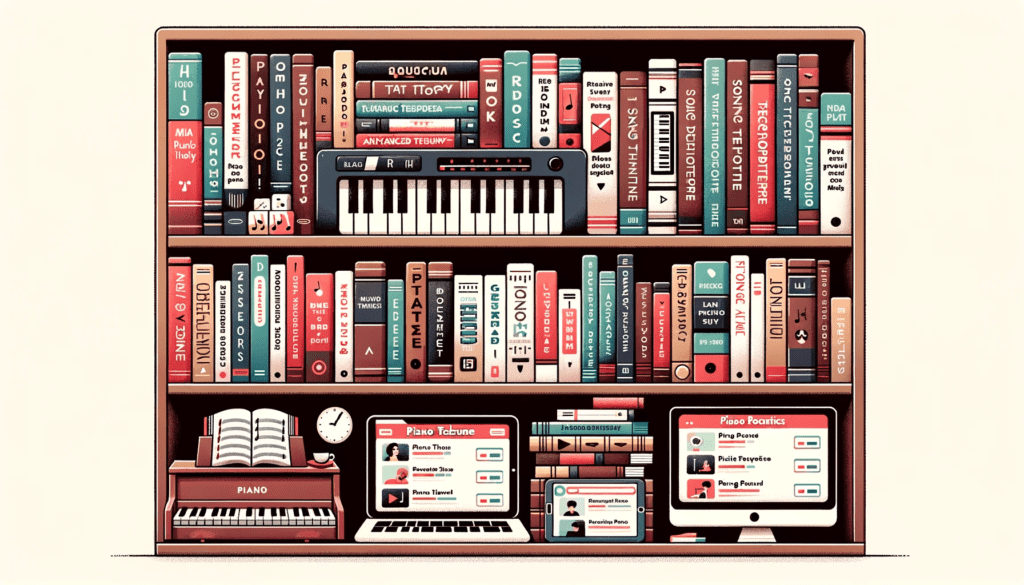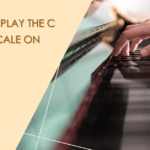Learning to play the piano can be an incredibly rewarding and fulfilling experience. With the right approach, dedication and practice, it’s possible for anyone to learn piano, whether you’re 5 or 95 years old.
In 2023, there are more options than ever when it comes to learning piano, from in-person lessons to online courses and apps. With so many choices available, it can be difficult to know where to start.
In this comprehensive guide, we’ll break down the pros and cons of various piano learning methods, provide tips on how to get started and practice effectively, and recommend the best resources for learning piano in 2023.
Traditional In-Person Piano Lessons

For many people, traditional in-person piano lessons are still the gold standard for learning piano. Taking lessons from a qualified piano teacher allows for personalized instruction, feedback and guidance as you progress.
Pros of In-Person Lessons:
- One-on-one attention and feedback from an experienced teacher
- Lessons tailored to your individual pace and learning style
- Opportunity to ask questions and get help in real-time
- Motivation and accountability to practice regularly
- Learn proper hand positioning and technique from the start
Cons of In-Person Lessons:
- Usually the most expensive option
- Need to accommodate the teacher’s schedule and location
- Quality of instruction can vary greatly between teachers
- Limited lesson time each week
When looking for an in-person piano teacher, it’s important to find someone who is a good fit for you. Consider their credentials, teaching style, experience and personality. Ask for references from current or former students. Most teachers will also offer an introductory trial lesson so you can get a feel for their teaching approach.
Expect to pay $30-60 per hour for lessons from a qualified piano teacher. Lessons are commonly 30 minutes for beginners, expanding to 45-60 minutes as you advance. With weekly lessons, you can expect to spend $100-200 per month.
My Experience
I started taking piano lessons when I was 7 years old. My teacher was Mrs. Jones, an elderly lady who lived down the street. She was very strict and made me practice scales and Hanon exercises for the first 2 years before allowing me to learn any “fun” repertoire.
I dreaded my weekly lessons because if I didn’t practice enough, she would rap my knuckles with a ruler! However, Mrs. Jones instilled good technique and note-reading skills that I still use today. The one-on-one attention allowed her to correct my hand position and posture. After 10 years with her, I advanced to an intermediate level.
Online Piano Lessons

In recent years, online piano lessons have become extremely popular, providing quality instruction in the comfort of your own home. Online lessons come in many forms, from pre-recorded video courses to live video chats with teachers.
Pros of Online Piano Lessons:
- More affordable than in-person lessons
- Teachers available across the world
- Flexible scheduling, often on-demand lessons
- Engaging video content and interactive tools
- Learn at your own pace, rewatch lessons
Cons of Online Piano Lessons:
- Lack of real-time feedback and corrections
- Difficult for teacher to evaluate technique
- Need tech tools like a keyboard, computer and webcam
- More accountability required as a self-directed student
Some of the most popular online piano lesson platforms include Skoove, Piano Marvel, Playground Sessions and Hoffman Academy. These provide structured, step-by-step video lessons along with sheet music, play-along tracks and games. Expect to pay $10-30 per month for a subscription.
For live online lessons, sites like TakeLessons allow you to schedule video chat lessons with vetted teachers. Rates are similar to in-person lessons, around $30-60 per hour.
My Experience
As an adult, I decided to pick piano back up but didn’t have time to commute to a teacher’s studio. I enrolled in an online course through Hoffman Academy. The step-by-step video lessons were engaging and easy to follow. I was able to go at my own pace and repeat lessons if needed.
The teacher could not physically correct my technique but provided feedback through video comments. I also downloaded supplemental sheet music and practiced songs from my favourite movies and pop artists.
The flexibility and interactive tools allowed me to progress faster than expected. Within a year I was playing early intermediate repertoire.
Piano Learning Apps

There are also many piano learning apps that leverage technology to make learning engaging and fun. These apps are best suited for beginners looking to learn the basics.
Pros of Piano Learning Apps:
- Interactive and game-like format
- Track your progress and earn rewards
- Listen to music samples and play along
- Affordable subscriptions $5-10 per month
- Available anytime on your mobile device
Cons of Piano Learning Apps:
- Focus mostly on beginner material
- Lack of deeper instruction on technique
- Not suitable for classical or intermediate players
- Small screens make reading music difficult
Top piano learning apps include SimplyPiano, Yousician, Piano Dust Buster and Tenuto. These apps listen to you play and provide real-time feedback on note accuracy.
My Experience
On family vacations, I used the SimplyPiano app to supplement my learning. The app was fun and gamified the experience through scoring and rewards. It focused mainly on beginner material so was too basic for my level.
However, it did help reinforce note-reading and rhythm skills. The biggest limitation was the small screen – I could not see the full music or hand position well. But as a supplemental tool it provided a nice change of pace from my regular lessons.
Piano Method Books

For self-directed learners, piano method books have been the traditional way to learn piano for generations. These books provide a structured sequence of lessons on technique, reading music and songs to practice.
Pros of Piano Method Books:
- Step-by-step lessons designed by education experts
- Wide selection of methods for all ages and skill levels
- Learn at your own pace by working through the books
- Relatively affordable cost for series of books
Cons of Piano Method Books:
- Lack of feedback without a teacher
- Easy to develop bad habits without guidance
- Not as engaging or interactive as modern methods
- Difficulty depends on the particular book series
Some popular piano method book series include Alfred’s Basic Piano Library, Bastien Piano Basics, Faber Piano Adventures and John Thompson’s Modern Course for the Piano. Expect to pay $5-15 per book.
My Experience
When I was a teenager, I worked through Alfred’s Basic Adult Piano Course books independently. The step-by-step lessons built my skills methodically. The theory was clearly explained and they incorporated technique exercises.
However, without a teacher, I developed some bad habits that later had to be corrected. The songs were not that inspiring or challenging for my level at the time. But as an adult beginner, they provided a solid foundation.
How to Get Started Learning Piano

Once you’ve decided on the learning method that appeals most to you, it’s time to start your piano journey! Here are some tips to get started:
Get a Keyboard or Digital Piano
You don’t necessarily need a traditional acoustic piano, especially when starting out. Affordable keyboards and digital pianos provide weighted keys and piano sounds for much less. Popular beginner models include the Casio CT-S200, Yamaha PSR-EW310 and Alesis Recital Pro.
Learn Music Fundamentals
When beginning piano lessons, it is important to start with the basics of music theory and fundamentals. Having a solid foundation will make learning piano much easier. Here are some of the core concepts to focus on:
- Note names: Learn the names of the notes on the grand staff and keyboard. This includes treble and bass clef notes like A, B, C, D, E, F, and G. Also learn sharps and flats.
- Rhythm and time signatures: Understand how notes relate to beats. Learn time signatures like 4/4 time. Be able to count rhythms and play in steady tempo.
- Musical alphabet: Understand the repeating pattern of notes. Learn whole and half steps between notes.
- Scales and key signatures: Practice major and minor scales in different keys. Learn the key signatures and how to identify the tonic note.
- Chords: Study triads, seventh chords, and chord progressions. Learn how chords are built and how they fit into keys.
- Reading sheet music: Work on treble and bass clef note reading. Be able to understand note values, rests, accidentals, dynamics, and other musical symbols.
- Ear training: Do exercises to improve pitch matching, interval recognition, and chord identification. This will develop musical listening skills.
- Music theory: Learn foundational concepts like intervals, chord construction, cadences, and harmony. Understand how music works on a structural level.
Starting piano lessons with this musical groundwork will provide the skills needed to progress quickly. Be patient, take it step-by-step, and work with a teacher to ensure proper technique and fundamentals. With regular practice, you’ll be playing songs and pieces in no time!
Effective Practice Techniques

Regular practice is essential for developing piano skills. However, not all practice is created equal. Use these techniques to practice as efficiently as possible:
Set Specific Goals
Don’t just play aimlessly. Set specific goals like learning a new song, mastering a certain technique or improving your sight reading skills. This will give your practice focus and purpose.
Work in Short Bursts
Practicing for hours on end is counterproductive. Limit practice sessions to 20-30 minutes and take breaks to avoid fatigue. Shorter bursts allow you to stay focused.
Isolate Difficult Sections
When learning a new piece, identify and isolate any measures giving you trouble. Repeat and loop these sections slowly until they are mastered.
Vary Your Drills
Don’t just keep mindlessly playing pieces over and over. Incorporate technique exercises, sight reading practice, scales, arpeggios and music theory drills.
Record Yourself
Recording pieces can help you self-critique and identify areas for improvement you wouldn’t notice just playing.
Be Patient
Learning an instrument takes time and patience. Stick with difficult passages and celebrate small wins. Progress won’t happen overnight.
Recommended Resources for Learning Piano

Supplement your chosen learning method with these additional resources to get the most well-rounded piano education:
YouTube Channels
Channels like Pianote, Josh Wright and Hoffman Academy offer free tutorials on technique, theory and repertoire.
Sheet Music Sites
Build your music library using sites like Musicnotes and 8notes. You can find simplified arrangements of popular songs.
Piano Play-Alongs
Playing along with backing tracks improves your timing and feel. Check out Music-Minus-One and Piano Street for piano accompaniments.
Music Theory Apps
Apps like Music Theory Pro and Tenuto are great for drilling theory, intervals, chords and rhythm.
Online Forums
For personalized advice from other pianists, visit forums like Piano World and Reddit Piano.
Conclusion: How Long Does it Take to Learn Piano?
Learning piano is a lifelong process, but how long does it take to gain basic proficiency? While there are many factors that affect progress, here are some general timelines:
- Beginner Level – 6 months to 1 year
- Early Intermediate – 1 to 2 years
- Late Intermediate – 3 to 5 years
- Early Advanced – 6 to 10 years
At the beginner level you’ll learn hand positioning, finger numbers, basic chords and be able to play some simple songs.
To reach an intermediate level expect to invest 1-2 years of consistent practice into building technique, sight reading skills and learning repertoire.
It takes even more time to progress beyond intermediate into advanced territory – at least 5-10 years. Advanced pianists can play challenging classical pieces, improvise across various styles and have impeccable technique.
While learning piano is a lifelong endeavour, the rewards are immense. With passion and persistence, playing beautiful piano music is within anyone’s reach. Choose a learning method that inspires you, set goals and enjoy the journey. The time and effort invested in learning piano pays back tenfold in the joy of making music.
FAQs
Q: What is the best way to learn piano?
A: The best way to learn piano is to find a good piano teacher or take piano lessons online. It is also helpful to practice regularly and play the piano every day.
Q: What are some ways to learn the piano?
A: There are several ways to learn the piano. You can take traditional piano lessons, use online piano courses, or learn through piano apps.
Q: I am a beginner. How can I learn to play the piano?
A: As a beginner, it is recommended to start with the basics. You can take beginner piano lessons or use beginner-friendly piano courses or apps. Practice regularly and be patient with your progress.
Q: How long does it take to learn to play the piano?
A: The time it takes to learn to play the piano varies from person to person. It depends on factors such as the amount of practice, dedication, and individual learning abilities. Generally, it takes several months to a few years to become proficient.
Q: Can I learn to play the piano without a piano teacher?
A: Yes, you can learn to play the piano without a piano teacher. There are many online resources, courses, and apps available that provide comprehensive lessons and guidance.
Q: How can I learn to play the piano by ear?
A: Learning to play the piano by ear involves listening to music and figuring out the melodies and chords on your own. It takes practice and training your ear to recognize different musical elements.
Q: Are piano courses a good option for learning?
A: Yes, piano courses are a great option for learning. They provide structured lessons, guidance, and often include interactive features to facilitate the learning process.
Q: What is a good piano for beginners?
A: A good piano for beginners is one that is affordable, has a good sound quality, and is suitable for practicing and learning. Digital pianos are a popular choice for beginners as they are more affordable and offer various features.
Q: How can I find the best piano instructors?
A: To find the best piano instructors, you can ask for recommendations from other musicians, check online reviews, or contact local music schools or organizations for referrals.
Q: Can I learn to play the piano online?
A: Yes, you can learn to play the piano online through various platforms that offer online piano courses. These courses provide video lessons, practice exercises, and interactive features to enhance the learning experience.





